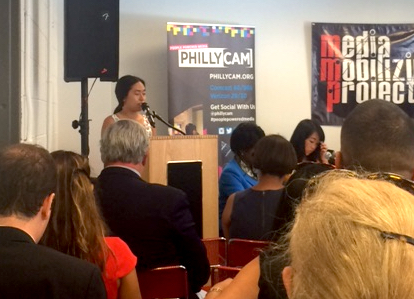Here’s how Philly can shrink the digital literacy gap
 August 1, 2016
Category: Event, Featured, Medium, Method
August 1, 2016
Category: Event, Featured, Medium, Method
Philadelphia has the third-worst broadband penetration rate of the top 25 largest cities in the United States. That translates to some serious inequity when it comes to who’s digitally literate and who’s not.
FCC Commissioner Mignon Clyburn joined a group of six panelists last week at PhillyCAM to discuss ways to increase internet access in disadvantaged communities, a growing concern in Philadelphia and across the nation.
Philadelphia is known as the poorest big city in the United States. And with the convention occurring this past week in Philadelphia, many minds were turned to how future leadership can assist the country’s most vulnerable populations in an increasingly digital world.
Technical.ly Philly Associate Editor Juliana Reyes moderated in front of a packed room of about 90 guests.
“What is digital inclusion to you? Why should we care about it?” Reyes asked to kickstart the panel.
“Making a resume, applying for a job, getting health benefits — these are all things that you need online access for,” explained Philadelphia’s chief administrative officer, Rebecca Rhynhart.
And for many fledgling internet users, embarrassment or suspicion often prevents them from seeking help, especially in the public setting of a library.
“The presumption that you have to be literate deters many from entering a library,” said Siobhan Reardon, president and director of the Free Library of Philadelphia. “We also have to work hard to convince individuals that we are not tracking them and that we trust them.”
Joshua Breitbart, senior advisor for broadband in New York City, cited his city’s recent use of a $2 million grant from Google as a productive way to increase trust between libraries and those who want to hone their internet skills. In addition to training new users, New York City used the grant to develop a program allowing users to bring hot spots into the comfortability of their own homes.
Many panelists also emphasized the need for collaboration in lessening the digital literacy gap.
“My word of the day is ‘and,’” said Clyburn, who is currently serving her second term as a Democrat on the Commission. “The conversation [about digital inclusion] should always be about equal pay AND access.”
Other panelists cited the 15-year franchise deal Philadelphia finalized with Comcast in December as an exemplary step towards full digital inclusion. The decision, which had been almost a year in the making, greatly expanded Comcast’s affordable broadband program.
“What happened in the Comcast franchise agreement was momentous because companies all across the country realized that you don’t have to be bullied by big corporations,” said Philadelphia City Councilwoman Helen Gym.
“We can and we should look throughout our digital ecosystem for ideas,” added Breitbart, saying that his office immediately reached out to its Philadelphia networks after the Comcast agreement to gain helpful tips.
According to Reardon, one of the difficulties Philadelphia faces in increasing digital literacy is that the Free Library is not allowed to operate directly within the public school system. They are, however, allowed to do unlimited amounts of outreach.
Antoine Haywood, director of membership and outreach at PhillyCAM, echoed Reardon’s call for more direct community engagement.
“We are here to increase access,” said Haywood of PhillyCAM, a nonprofit founded on the principle of inclusive media. “Everyone wants to be connected, and you’re limited if you’re trying to do things by yourself.”
Trending News










